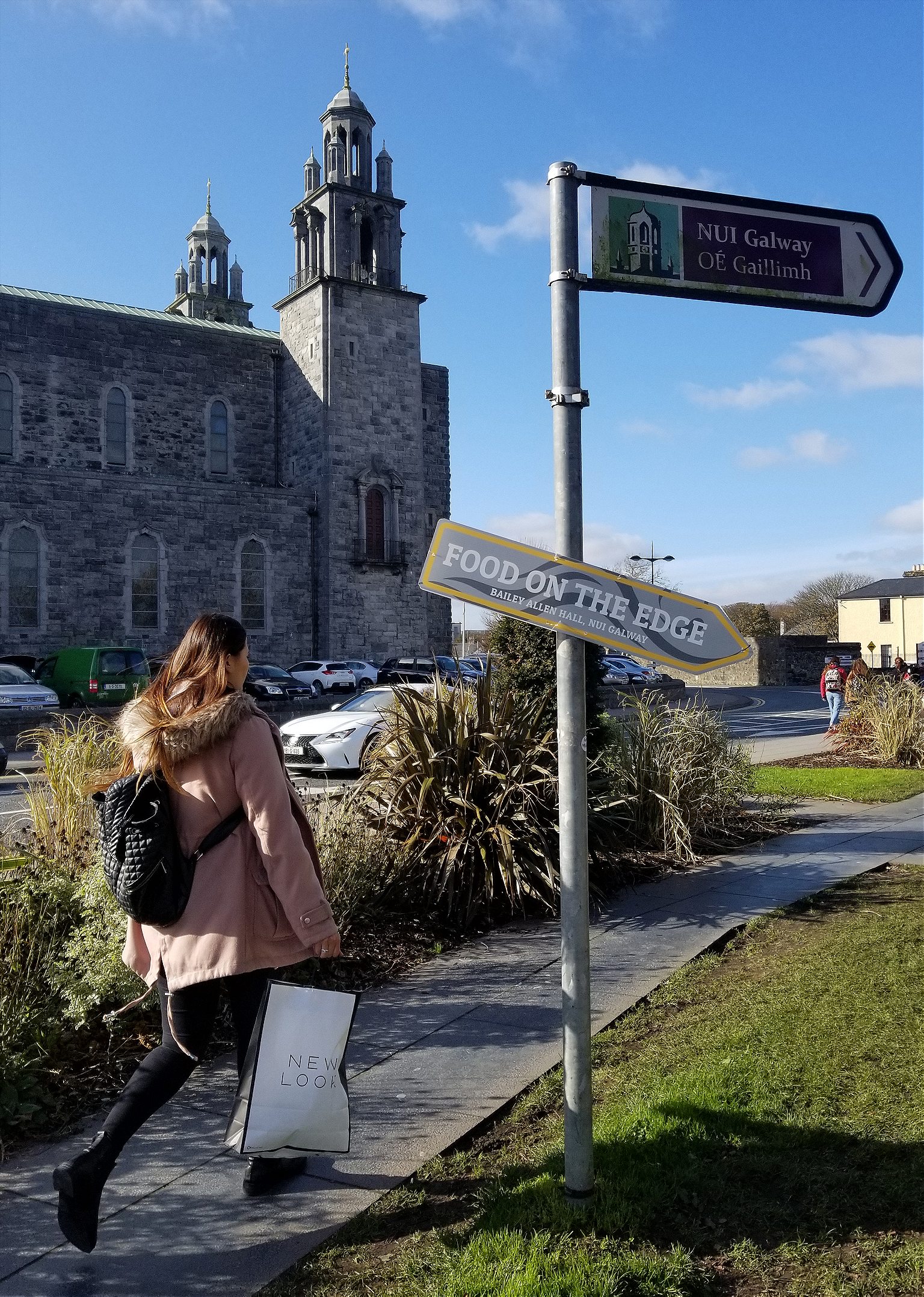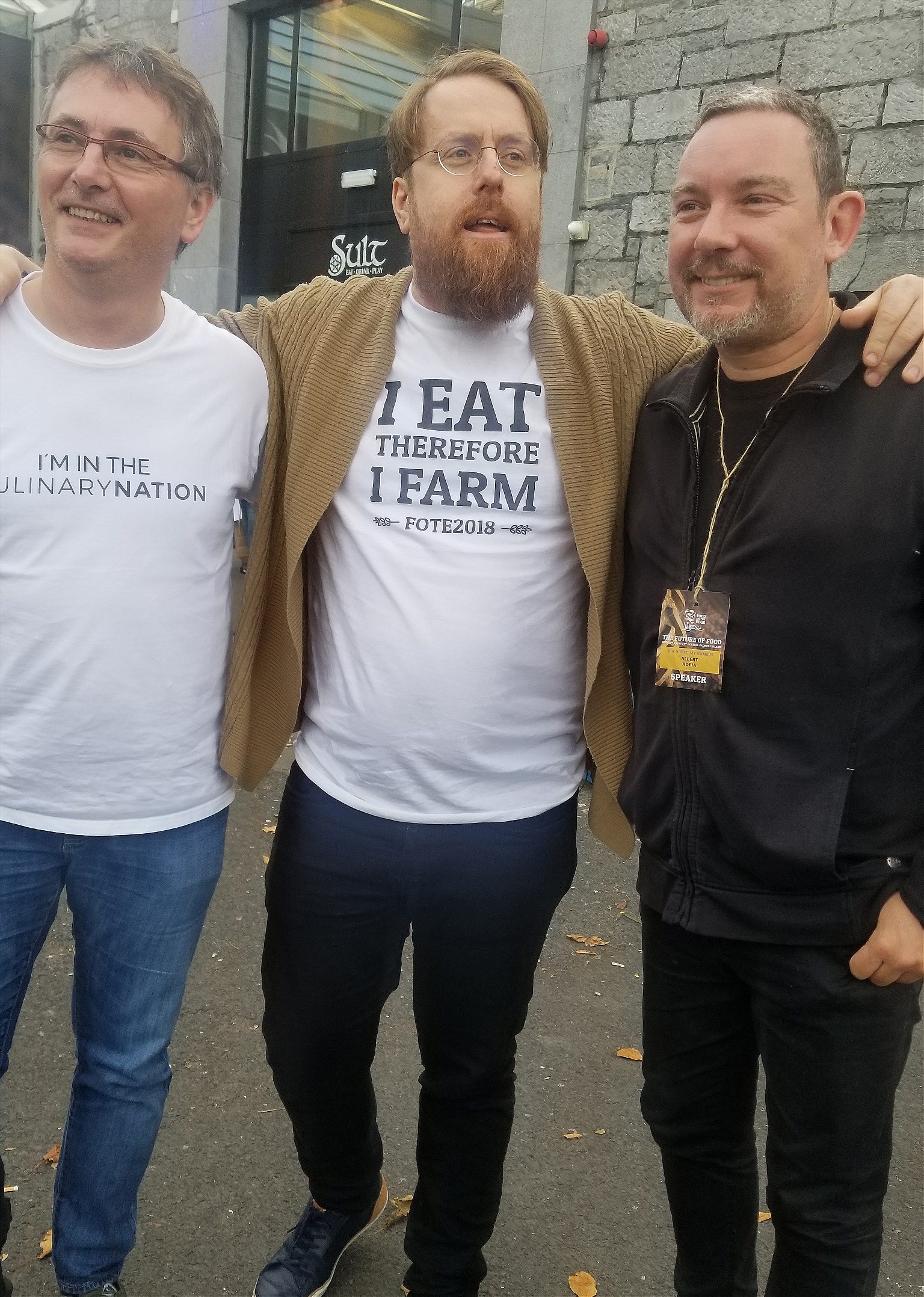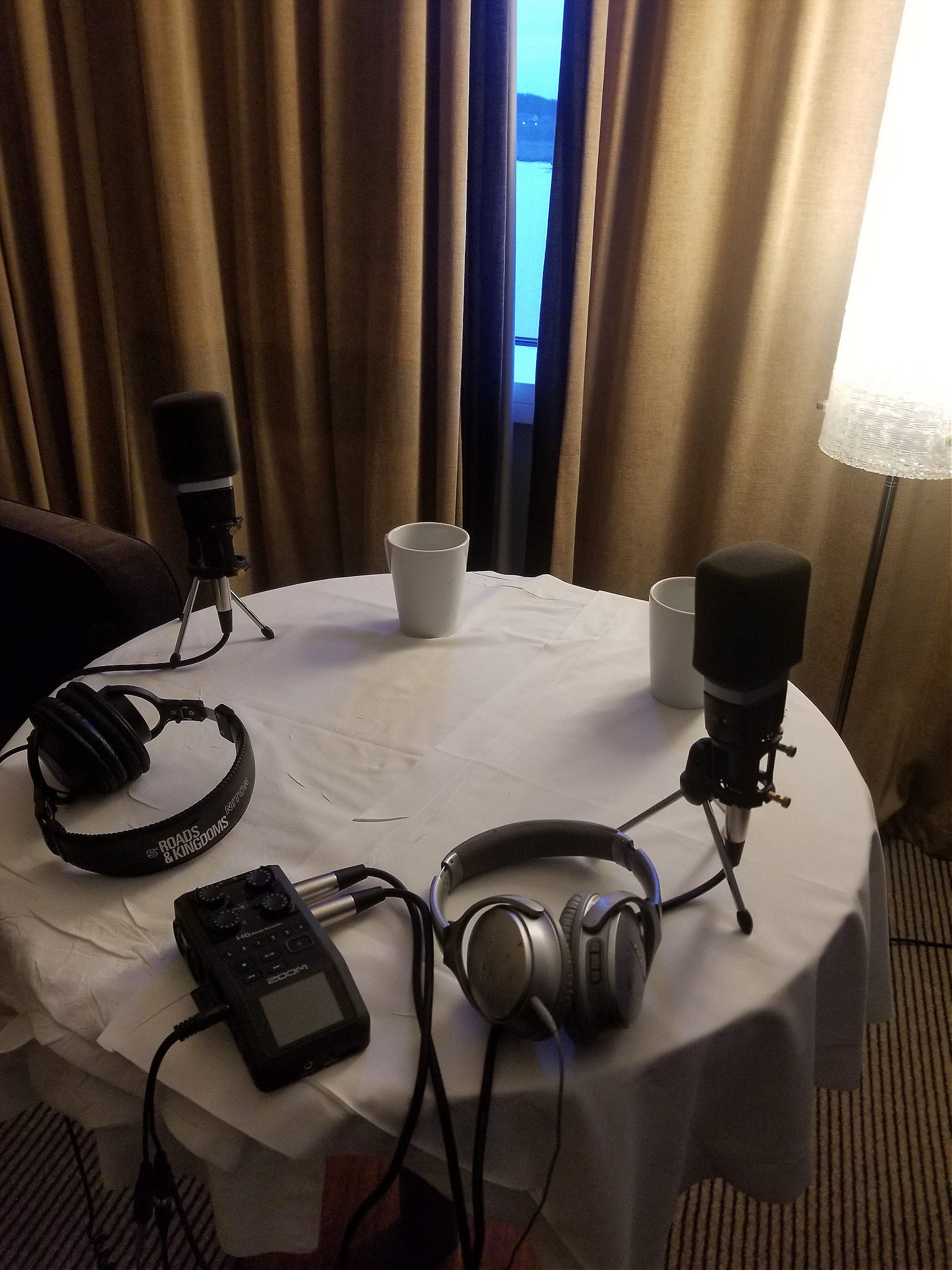One of Ireland’s great chefs, JP McMahon, talks swan pie, pickled heron, and other delicious cruelties of yore.
This week on The Trip: Drinking with Exceptional People Around the World, Nathan knocks back Dingle Gin and elderflower cocktails with Irish chef JP McMahon as they discuss McMahon’s annual food conference, his path to becoming a writer, and the delicious cruelty of pickled heron. McMahon also shares how he’d transform a swan into a delicious pie.
Here is an edited and condensed version of Nathan and JP’s conversation. You can listen to the full episode, for free, on Apple Podcasts, Stitcher, Spotify, or wherever you get your podcasts.
Nathan Thornburgh: JP, what are we drinking?
JP McMahon: We’re drinking Dingle Gin. We’re going to have Dingle Gin and some elderflower that we’ve preserved from earlier on in the year.
Thornburgh: What is Dingle Gin?
McMahon: Dingle Gin is a gin that’s brewed in Dingle. I suppose it’s part of the gin revolution that’s happened in Ireland and around the world.
Thornburgh: Nice. So we’re here in Galway, Ireland, for Food on the Edge. Food on the Edge is an annual conference and it’s been going on for five years?
McMahon: Four years.
Thornburgh: Its become one of the of the must-do stops in this very interesting subculture of like culinary wanderers.
McMahon: Yeah. I try to keep on trying to fly the Irish flag. I mean for the majority of the 20th century, I don’t think we had much of a food culture. Of course there were pockets of greatness, like small greatness but by and large, we were I suppose a country that produced food for export, you know? We exported oysters, we exported beef, we exported mussels, lobsters, crab.
I suppose in the last 20 years or so, the Irish food industry has come together. You can’t just put it down to one man and one restaurant but it’s a whole cultural shift. There’s a certain organic-ness to making it happen, but also there’s a lot of constructive things that you can do and I’d like to see that happen in Ireland, you know?
Thornburgh: Not only are you a great chef but you’re also a writer and a communicator. What drives you to write about food?
McMahon: I’m so fascinated with stuff like seaweed, and oysters, and shellfish, which have been here thousands of years and thinking about like why aren’t they in the normal narrative of our every day eating? We have a national dish of bacon, cabbage, and mash and it’s a tragedy when you think of stuff like sea urchins, you know, and it’s really hard to get wild sea urchins now in Ireland because we over-fished them in the 70s and we sold them to everyone else. We just fucking sent them out.
I suppose in the last 20 years or so, the Irish food industry has come together.
Thornburgh: What was your first moment of culinary clarity?
McMahon: Probably the first culinary epiphany I had—I don’t know what age I was, maybe I was 11 or 12—was when my family and I were on holidays in Tipperary, and we went into a hotel to eat. And my mum was ordering burgers for everyone. And then for some reason, this was pre-cooking, I said, “I’m going to have the spaghetti bolognese.” And I remember my mum saying, “You’re not going to eat that, you won’t like it.” And I said, “No, no, I’m going to have it.”
And then I ate this spaghetti bolognese. And I mean, it could have been shit, I can’t remember. But in my mind, it was the most magnificent thing I’d ever eaten. And it was different. And it was a way of making, of separating myself from everyone else, saying, “I eat the spaghetti bolognese. You eat the burgers. You’re the peasants,” you know. “I know what I’m doing.”
Thornburgh: You eventually started working in kitchens, but you’ve said Anthony Bourdain and his writing were a big influence on you when you were young.
McMahon: He was a big influence in terms of being able to combine those two things—cooking and writing. And I started writing, and I really got into it, when I was about 15 or 16. Once I finished school, I started working in kitchens but I was also trying to juggle writing at the same time. I even went on to start trying to get a Ph.D. That’s why, I suppose, Bourdain’s story chimed so well with me.
But I still feel, in spite of having written a cookbook and the fact that I write a column in the national newspaper every week, that I’m not a writer yet.
People always say to me, “Do you not feel bad you didn’t finish the Ph.D. ?” But, I mean, I might have written half a million words.
Thornburgh: Fuck those guys.
McMahon: Yeah. But, it didn’t … I don’t think I would have written a cookbook if I hadn’t have failed doing the Ph.D. ‘Cause it taught me how to write. And it taught me how to think, and to structure things. And I think I took all the best bits and wove it into the story that our Cava cookbook tells, which is “Why cook Spanish food in Ireland? What are the reasons to do it?” And of course, one is personal, but there are also historical reasons, and there are also cultural reasons. And I just wanted to explore them, somehow.
Thornburgh: That’s one of the things that always stood out about you, was like, “Here’s a man who started in restaurateuring in Spanish cuisine, in Galway.”
McMahon: I love Spain. We went to Barcelona quite a bit, when we were in college, had friends living there. My wife’s brother lived there. And I think the two things that stick out to me was the way—and this also ties in with the Italian—the way that food was embedded in the culture. When you go out for drinks, you shared food. And that didn’t exist in Ireland. You went to the pub, you didn’t eat. You just drank. And I just really loved that way of eating, that kind of communal way of eating, and the variety of different food. So 10 years ago, I decided to open up a tapas bar called Cava that was like an homage to Spain.
People really loved it, as well, because it was such a new way of eating in Ireland. And I remember people having difficulty sharing food. It took about two years for people to get comfortable with the idea of sharing food because having individual plates was like their security blanket.


Thornburgh: The toothpick is the plate.
McMahon: Absolutely. When we first opened, we actually had an a la carte and a tapas menu. And at the beginning, it was about 70 percent a la carte and 30 percent tapas. And then when we moved Cava, after five years, we said, “We’re not going to put on any main courses, other than paella.” And it took a while for people to get used to it.
Thornburgh: How many people did you have to forcibly eject from the restaurant before that happened?
McMahon: A few. You know, I had a few arguments with people in my day at Cava. We had four people walk out because we didn’t do steak.
I remember, this woman waving the fucking lamb chop in my face, because it was listed as “rack of lamb.” And so, we had cut two individual chops off the rack. And she was like, “A rack is always four.” And I was like, “A rack is not always four. A fucking rack of lamb is eight or nine. It’s got eight or nine ribs.” And she was like, “No.” And she was swinging this fucking chop in my face. Honestly, she got me on a bad day, and I fucking threw her out of the restaurant. I refused to take her money. It’s a great pleasure to throw people out of restaurants.
Related Reads
Thornburgh: I feel like you’ve just kind of revealed some Groupon for a great discount at your restaurants. Go in and be a complete unreasonable ass, and JP will, perhaps, get to the point where he will not accept your money. If you can handle the conflict.
Okay, let’s do a speed round question. I’m looking at Lough Atalia, and I’ll put a picture of this in the show page.
McMahon: Lough Atalia, yeah. It’s a small lough off Galway Bay.
Thornburgh: It’s like an estuary situation going on there.
McMahon: Yeah, a small estuary.
Thornburgh: There’s a lot of waterfowl. There’s something living in the muck. Gimme a course that you’d make from Lough Atalia.

McMahon: Lough Atalia. Jeez, I’d eat a swan, no?
Thornburgh: Oh, I like that.
McMahon: Yeah, I don’t think you’re allowed to eat swans.
Thornburgh: How do you think it would taste?
McMahon: I had a Dutch guy in the restaurant that asked me, “Why don’t you eat the swans?” I didn’t know so I had to go and look it up on Google.
Thornburgh: Unnerving. Very unnerving.
McMahon: ‘Cause one guy was camping not too far from Lough Atalia, and they found, he had barbecued a swan. And it wasn’t illegal, but at the same time people had frowned upon it, saying, ” Oh, the poor swan.” But no one gives a fuck about the turkeys, you know?
Thornburgh: Yeah, yeah. Land swans.
McMahon: But the reason why we don’t eat swans is they don’t reproduce fast enough. They used to eat them in Holland. That’s why he was asking me. And also they’re too big to fit in an oven.
the reason why we don’t eat swans is they don’t reproduce fast enough
Thornburgh: Jesus. They’re pretty aggressive too. You’d have to come ready to fight.
McMahon: For sure. One of the interesting recipes I came across when I was writing this Irish food cookbook was pickled heron. I thought they meant to say herring, and I showed it to a food historian and she confirmed it was the bird. The recipe from 1780 said, “Take 100 herons and chop their heads off. Eviscerate the herons …” And then it went on to put spices like mace, and nutmeg, and cinnamon, and then to pickle them. You know what it reminded me of? Almost like an escabeche.
Thornburgh: Right, right.
McMahon: Which is something they still do in Spain with guinea fowl.
Thornburgh: But this recipe is slaughter on like an Audubon level.
McMahon: For the swan, I think you probably need a lot of butter because the swan is pretty lean. You know what I think we could do? We could brine him in the salt water. Then we could tenderize him. Then wrap him in the kelp and cook him really slowly. After that, we could put him back into his feathers. And no wonder so many people got food poisoning. They used to like bake the swan and then wrap its flesh back over it.
Can you imagine the amount of bacteria that would be hanging around? Everyone just going in for swan pie. And they go, “Oh Jimmy died.” “What’d he die of?” “I don’t know. We can’t work it out.”
Thornburgh: I mean, that’s where like chef and serial killer really kind of come together.
McMahon: A 100%. Hopefully, you don’t get any complaints on the podcast about my swan recipe.
Thornburgh: No, people love this. The killing swan stuff will be great.
This conversation was edited and condensed. Listen/subscribe to the podcast on Apple Podcasts, Spotify, or Stitcher.






